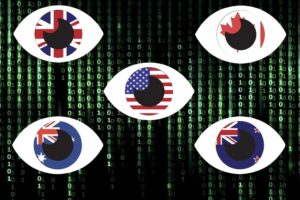Canadian federal officials say a new intelligence deal between the U.S., the U.K., and Australia will not impact the country’s ability to protect key interests in the Indo-Pacific — but won’t say whether Canada was actually offered a chance to join the pact.
Known as the AUKUS agreement, the pact is being billed by the White House as a game-changing security partnership in a region the commander of the Australian navy has described as the “epicentre” of a “rapidly deteriorating” geopolitical environment.
“In the Indo-Pacific, military modernization is occurring at an unprecedented rate … the technological edge enjoyed by Australia and its partners is narrowing,” said Australian Vice-Adm. Michael Noonan in a video announcement of the deal.
“It is important now more than ever that our navy is able to deter and respond to threats in our region.”
According to The Guardian newspaper, New Zealand Prime Minister Jacinda Ardern said officials from her country “weren’t approached, nor would I expect us to be” about joining the deal.
Canadian Prime Minister Justin Trudeau did not say on Thursday whether Canada was offered a spot in the new pact, but said Canada does not want the nuclear submarines that the deal will allow Australia to begin manufacturing using U.S. and U.K. technology.
“This is a deal for nuclear submarines, which Canada is not currently or anytime soon in the market for,” he said when pressed about Canada’s absence from the deal on Thursday.
Trudeau did not mention that the deal also includes provisions to boost cooperation between the three countries on cybersecurity and artificial intelligence — the latter of which was emphasized in a major 2017 position paper on the future of the Canadian military as key capabilities.
Artificial intelligence, as well, has been a recurring focus for the Liberals over recent years as part of the government’s emphasis on building globally competitive, future-looking industrial capabilities.
Canada’s former vice chief of the defence staff and former head of the navy, retired Vice-Adm. Mark Norman, called Trudeau’s comments about not being involved in the pact because of a lack of plans to acquire nuclear submarines“erroneous” and “misleading” in a Twitter post.
“This #AUKUS arrangement is about much more than new #Submarines; it is about information & technology sharing,” he tweeted.
The pact is widely being seen as a bid by the U.S., the U.K., and Australia to counter rising Chinese aggression and military technological advancements around the Indo-Pacific region, which includes the South China Sea international navigation route.
China has been increasingly aggressive in the region in recent years, ignoring international laws as leaders there push to build out a territorial foothold with man-made islands.
Brett Bruen, a consultant and former U.S. diplomat, told The Canadian Press that Canada may want to keep its distance from the pact to avoid aggravating existing tensions with China.
But one government source told Global News that Canada’s absence from the pact “categorically” has nothing to do with concerns about aggravating China, which has detained two Canadians for more than 1,000 days.
The source downplayed the impact of the pact on Canada and said there’s no expectation it will lead to Canada being excluded from any intelligence sharing, but would not say whether Canada could lose out on any access to advanced cyber and artificial technology capabilities that may be shared through the pact.
While the source said Canada was made aware of the deal in advance, they repeatedly did not answer clearly when asked by Global News whether an offer to join it had been extended to Canada prior to the government publicly stating it had no interest in being part of the deal on Thursday.





































